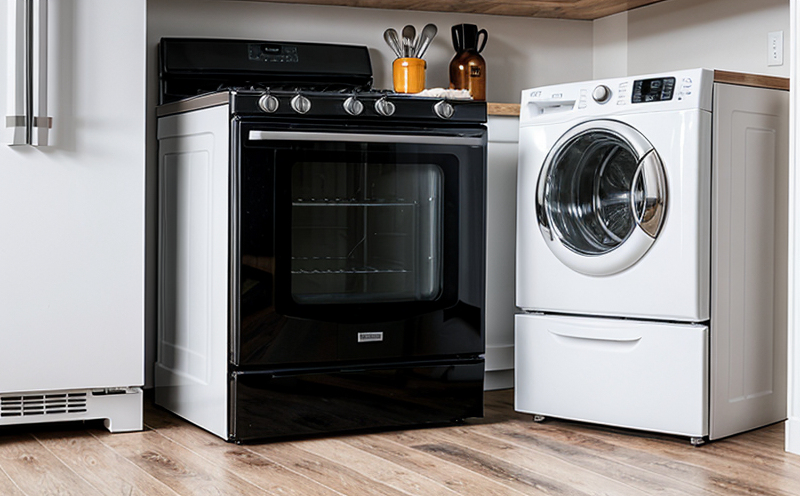Current Efficiency Testing in Appliances
In today’s world, household appliances play a crucial role in our daily lives. They are expected to perform efficiently while maintaining safety standards and complying with environmental regulations. Current efficiency testing is a vital process that ensures appliances meet the necessary performance benchmarks set by international standards such as ISO 5007 for electric motors.
The primary focus of current efficiency testing is to measure how effectively an appliance converts electrical energy into useful mechanical work or heat without excessive power loss. This testing plays a significant role in product development, quality assurance, and compliance with regulatory requirements. By conducting these tests, manufacturers can ensure their products are as efficient as possible, which not only enhances user satisfaction but also contributes positively to environmental sustainability.
Efficiency is typically measured using the following parameters:
- Input Power: The total electrical power supplied to the appliance.
- Output Power: The useful power delivered by the appliance, such as mechanical work or heating energy.
- Loss Power: The difference between input and output powers, representing wasted energy.
To perform these tests accurately, laboratories use advanced equipment like power analyzers and calorimeters. These instruments help in measuring the exact values of input and output powers, thereby providing precise data on efficiency losses. Proper specimen preparation is also crucial; this includes ensuring consistent operating conditions across all tested units so that variations due to environmental factors are minimized.
Once testing is completed, detailed reports are generated outlining key findings regarding each appliance’s efficiency level compared to industry benchmarks and relevant standards. These reports serve multiple purposes including internal quality control measures within manufacturing plants as well as external audits by regulatory bodies ensuring compliance with legal requirements.
Efficiency improvements in household appliances can lead to significant reductions in energy consumption, thereby lowering operational costs for consumers while simultaneously reducing greenhouse gas emissions associated with electricity generation. For instance, improving the efficiency of refrigerators could result in substantial savings over their lifetime and contribute positively towards global efforts aimed at combating climate change.
It is worth noting that current efficiency testing goes beyond merely assessing individual components; it considers how various elements interact within a complete system. This holistic approach ensures that any potential inefficiencies arising from integration issues are identified early in the design process, allowing for necessary adjustments before mass production begins.
In summary, current efficiency testing is an essential aspect of modern appliance development and quality assurance processes. It helps manufacturers produce reliable products that meet stringent performance criteria while promoting sustainable practices aligned with broader societal goals. By investing time and resources into thorough testing procedures early on in the product lifecycle, companies can build trust among consumers who appreciate energy-efficient solutions that contribute positively to environmental preservation efforts.
Eurolab Advantages
At Eurolab, we pride ourselves on providing top-notch services tailored specifically for the needs of our clients in consumer products and product safety testing sectors. Our team comprises highly skilled professionals with extensive experience across various domains related to household appliance testing.
- Dedicated Expertise: We employ specialists who specialize in conducting current efficiency tests according to recognized standards like ISO 5007.
- State-of-the-Art Facilities: Our laboratories are equipped with cutting-edge instruments capable of delivering accurate results consistently across multiple trials.
- Comprehensive Reporting: Every test comes accompanied by detailed reports highlighting strengths and areas for improvement, ensuring full transparency throughout the evaluation process.
We understand that maintaining compliance with ever-evolving regulations can be challenging. That’s why we offer tailored solutions designed to meet specific client requirements efficiently and effectively. Additionally, our commitment to continuous improvement ensures that all staff members are kept up-to-date on industry trends and best practices through regular training programs.
Our dedication extends beyond just performing tests; it includes offering valuable insights based on our findings which can guide strategic decisions made by clients regarding product development and marketing strategies. By leveraging this knowledge, businesses stand to gain competitive advantages in highly competitive markets.
International Acceptance and Recognition
The significance of current efficiency testing cannot be overstated given its role in ensuring compliance with international standards and certifications. Many countries have adopted similar approaches to regulate energy consumption within their borders, reflecting the global commitment towards promoting sustainable practices.
- ISO 5007: This standard provides guidelines for measuring motor efficiency under defined conditions, which forms a cornerstone of our testing methodologies here at Eurolab.
- NEMA Premium Efficiency Motors: The U.S. National Electrical Manufacturers Association has established this premium specification aimed at encouraging higher levels of efficiency in induction motors.
By adhering to these internationally recognized frameworks, we ensure that our clients receive accurate assessments that are universally accepted across different jurisdictions. This consistency helps build credibility not only with regulatory bodies but also among end-users who value quality and reliability when purchasing appliances.
Environmental and Sustainability Contributions
The importance of current efficiency testing in promoting environmental sustainability cannot be overstated. By ensuring that household appliances operate at optimal levels, we contribute significantly to reducing overall energy consumption and associated carbon footprints.
- Reduced Energy Consumption: Higher efficiencies translate directly into lower electricity bills for consumers, thus fostering cost savings while simultaneously decreasing reliance on non-renewable sources of power generation.
- Emissions Reduction: With less energy being consumed by efficient appliances, there is a corresponding decrease in greenhouse gas emissions resulting from fossil fuel combustion processes used to produce electricity.
- Resource Conservation: Efficient appliances help conserve natural resources by reducing the demand placed on power plants and infrastructure necessary for supporting large-scale industrial operations.
Incorporating current efficiency testing into product design early stages allows manufacturers to identify opportunities for improvement that could have otherwise gone unnoticed. This proactive approach leads to innovations that benefit both the environment and society at large.





